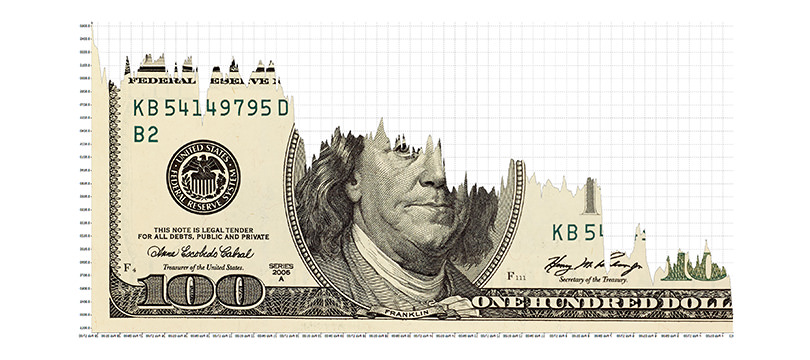How Inflation Impacts Forex Markets
December 18, 2020

Inflation is one of the few economic parameters that has crossed the boundaries of financial discipline and has settled in the collective imagination. The main reason lies in the impact that inflation has on everyday life. The reason is essentially practical, therefore, but it can represent a good starting point for aspiring traders who want to learn how to carry out a speculative activity properly, especially from an analytical point of view.
In this article, we discuss the importance of inflation for Forex Trading, i.e., its impact on the currency market. Finally, we will also offer some advice on how to best exploit inflation-related news.
A definition of inflation
What is inflation? In general, as we have already mentioned, everyone knows the meaning of this term. A very rough definition, but one that belongs to the collective imagination, suggests that inflation is nothing more than the percentage change in retail prices.
An increase or decrease in inflation outside the boundaries of physiology generates tangible consequences in many fields. In private life, i.e., when purchasing a particular good, but also at the macroeconomic level and, obviously, speculative.
In essence, inflation also affects, and perhaps above all, the currency market.
Inflation is not an official term, although it is now accepted even within the community of analysts and investors. Its full name is the Consumer Price Index, often summarized with the acronyms "IPC" if the reference language is Italian, or "CPI" if English is used.
Inflation is the result of a study on real prices, or rather on a basket of products. In fact, the basket is subject to frequent, if not regular, changes. The basic idea is to offer a snapshot of the burden that consumers have to bear. It is obvious, therefore, that the basket must be as up-to-date as possible and contain medium-high consumption products.
Inflation as a direct market mover
Inflation is a direct market mover, i.e., a parameter that can impact more or less immediately and objectively on the prices of a currency.
The issue, in this case, mainly concerns the methods of detecting inflation or rather the consumer price index, and the dynamics that are triggered by the latter.
To understand this dynamic, it is necessary to talk about the activities of central banks. Among their goals is the maintenance of inflation at desirable levels, which incidentally correspond to 2% per year.
Well, if inflation changes in an inappropriate way or remains at unbalanced levels, the central bank intervenes.
Specifically, when inflation is too low, the central bank lowers interest rates. Conversely, when inflation is too high, the central bank raises interest rates.
The manipulation of interest rates, acting on credit, modifies the money supply, i.e., the amount of money in circulation. In turn, the latter affects prices according to the law of supply and demand and the theory of the velocity of money.
These dynamics are objectively reflected and are essentially technical in the relationship between currencies. Again, the law of supply and demand comes into play. Consequently, a currency that undergoes an interest rate cut will tend to weaken against currencies that are not experiencing the same fate.
All this generates a huge impact in the Forex market and consequently guides the actions of traders. An investor buys or sells a particular currency, also and above all based on inflation, as it determines the moves of the relevant central bank, as we have seen.
Inflation as an indirect market mover
Inflation also has an indirect impact, i.e., it triggers dynamics that do not respond to criteria of objectivity, but are based on elements of evaluation and interpretation that can be considered personal, if not even subjective.
The issue revolves around the meaning that investors, analysts, and experts assign to inflation.
The truth is that inflation is much more than a parameter that returns the variation in prices. In a sense, it is the litmus test of a country's economic stability. It is no coincidence that the reputation of countries afflicted by excessively high inflation is lacking.
In a sense, inflation is the expression of the strength of an economic system. If it remains within the canons of equilibrium, then the country will be perceived as thriving. Conversely, if inflation is subject to imbalances (in one sense or the other), the country will be perceived negatively.
In turn, this perception guides the choices of Forex traders. Traders generally tend to buy strong currencies and sell weak ones, unless they adopt highly speculative and therefore risky approaches.
A fundamental piece of advice
The advice, therefore, is to give inflation the importance it deserves, and to integrate its monitoring and study into the analysis activity.
Obviously, it is not enough to keep an eye on inflation to exploit it to one's advantage. It is necessary, in a sense, to understand the price dynamics of the various economic systems, to understand if the inflation detected at a given moment is physiological or rather represents an element of rupture compared to the past. In short, the analysis must be somehow "diachronic", and develop over a very broad time horizon.
Another piece of advice is to consider not only inflation in its raw form, i.e., the so-called consumer price index, but also all the other parameters that somehow anticipate inflation and suggest its trend. The reference is to price surveys at an earlier stage of the supply chain. The object of study, for example, should also be the producer price index, i.e., inflation studied at the passage of goods from producer to seller.




